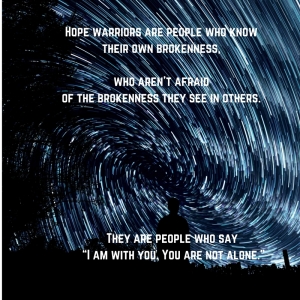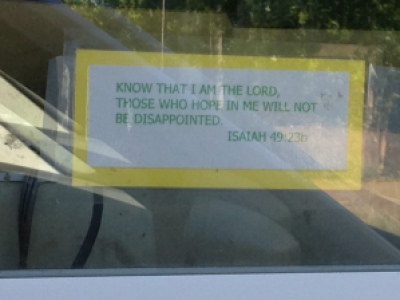I am excited to have Stefani Carmichael as a guest today. Not only is Stefani is one of the Hope Warriors in my life, she is also a Hope Warrior in the lives of the teen girls that live in her dorm.
She is gifted at helping the girls see the lies that they are believing, and encouraging them to replace those lies with truth. For some of these girls, she is the first person in their lives to teach them how to fight for hope, especially when their circumstances feel hopeless.
Stefani also blogs at heartsoulstrengthandmind.com , so be sure to jump over to her site and check it out.
***************
Helping Others Fight for Hope
What is harder than being in a black hole?
Harder than being in the middle of a fog in your life and not seeing your way out?
In my experience, the only thing harder than that is seeing those you love sink down into that pit and knowing you cannot pull them out.
Recognizing that you cannot pull someone out of the pit is really the first step of being able to help them. I learned this the hard way. If you will expend all your energy trying to pull them out, you might get pulled into it in the process.
At the same time, you can help someone who needs hope. You cannot force them to have hope. You can’t manhandle them into feeling better.
You can inspire, encourage, and support them in their fight. You are not Rocky Balboa, you are one of those in his corner.
I am approaching this topic with lessons I have learned through experience. In the process of gaining experience we often make mistakes along the way, and I certainly have. When I write about what not to do, it’s because I have probably done it at some point in my life. I hope anytime I have made mistakes in this area, that those battling with me will extend me grace and understand the heart I have had to help.
It would be incredibly difficult to help someone fight for hope if you have never been in a situation in which you felt hopeless. I imagine we have all been to that place, but if such a time doesn’t come to mind, you might first want to take a step back and remember.
When you remember the weight of your own battle, you will be better equipped to support someone in their own time of need.

This time of remembering prepares you to listen.
This sounds easy, but Iistening well is often the hardest part. When someone you love is in a pit, you want so much for them to be out and back to normal. You may be tempted to think you know what is wrong and just jump to solutions. Don’t.
You may even know what they need to do. You may even understand. But telling them is not going to get them where they need to be. Because someone who is hopeless is not going to automatically believe you know what you are talking about and can help them.
From their perspective, there is no way out.
From their perspective, things could probably not look any bleaker.
For them to listen to any suggestions or advice, they first have to know you understand the serious position they are in. You show them this by intently listening to them, rephrasing what they have said to make sure you really do understand.
This process is also essential, because you may not understand as much as you think you do. You may have experienced a similar situation, but that doesn’t mean that your pain is the same as their pain.
There is no timeline for how long you stay in this stage with someone. There may be a lot of listening involved with some people before they believe you understand.
It may take one conversation or several before you get to the point to move forward.
When you understand well, it is time to share. The point of sharing is not to say, “That’s nothing, look at all I have been through.” Its not to compare pain. If it comes off looking this way to the person who is struggling, it will do more harm than good.
The point of sharing is to let the other person know you also have suffered in your life, and while it may have been a very different situation, you found your way out of the suffering.
This is the point where you can begin to offer hope.
The hope comes in the message that if you walked through the blackness and found yourself back in the light, against all appearances, they also can find themselves in the light again.
This doesn’t have to come from just your story. The Bible is full of stories of those who were in seemingly hopeless situations, sometimes for a very long time, before God’s deliverance.
The stories of Abraham, Joseph, the Israelites in the wilderness, Ruth, Esther, Nehemiah, and countless others attest to incredibly bleak situations that did not remain bleak.
God’s word provides encouragement to those who are in the middle of dark places. These stories entailed long periods of difficulty and do not look anything like the band-aid fixes people often offer those in the middle of serious struggles.
People in the middle of difficulty don’t need to be led into a false hope that everything will change quickly. They need a surer hope that keeps them moving when they do not see the end of their struggle in sight.
They need the hope of a 75-year-old Abraham who still doesn’t have the child of promise and won’t for over 20 more years. They need the hope of Joseph whose troubles did not end with his promotion as a slave, or even when the chief cupbearer was restored to his position. They need the hope of Esther who saw a 360 degree change from complete despair to rejoicing overnight.
Point them to the Hope-Giver
All these stories offer hope because situations changed dramatically. Dark situations are so pivotal, because in the middle of them we can give ourselves over to despair if we let ourselves.
The stories above do not simply offer hope because they show that we might find our situation change if we just keep going. They offer hope because the people in these situations have a relationship with the Hope-Giver.
The God who we can trust, who has the power to change things for our good gives hope, because he is the only one who can really change our darkest situations.
At the beginning, I wrote how understanding that you can’t pull someone out of their dark pit is essential in offering hope. But, it is also essential to understand that God can.
God is fully able to change things. And he gives promises to do just that. When a fellow brother or sister in Christ is in the pit, you can offer hope-giving promises to them.
“And we know that in all things God works for the good of those who love him, who have been called according to his purpose.” Romans 8:28
This verse is used so much for a very good reason. It has inspired people in their darkest hours for centuries. If you love God, this verse is a message of hope for you. Its not a band-aid to stick on a problem. It shouldn’t be thrown to someone before you have sat with them in their grief. All of Romans 8 is an encouragement to those who suffer deeply. If you read it through in entirety you see in verse 38 that this promise meant for the most difficult of situations:
“For I am convinced that neither death nor life, neither angels nor demons, neither the present nor the future, nor any powers, neither height nor depth, nor anything else in all creation, will be able to separate us from the love of God that is in Christ Jesus our Lord.” Romans 8:38
We are hearing this from a man who is currently under house arrest, has faced beatings and being pelted with stones. He has survived a shipwreck and has a perpetual “thorn in the flesh.” Paul knows suffering when he writes this.
Do something Tangible
God’s sovereignty is a huge comfort, but it is not an excuse for inaction. You know you can’t lift someone from their pit, but you can help.
The good Samaritan did not pass by, and if our heart is aligned with God’s heart, neither will we.
Pray and ask God to show you what you can do in the person’s situation. It may be as small as flowers, or as big as getting church leaders involved to help someone financially beyond what you are capable. Sometimes there are actions we can do to help another significantly in their distress. While you don’t want to enable destructive patterns, there is a time and place for significant help.
Tangible assistance can also be things that help with their mental battle—these things need not be physical. Perhaps they are believing lies that are destructive. Have them write them out on paper, and then work with them to change each lie to a true statement that offers hope.
Walk with them
Finally, stay in the picture. Hope warriors are in a battle. Don’t just show up for the first round of the fight, stick around to see the victory.
They may need help planning steps in the right direction. Have them write out their goals and see if there are proactive steps they can take now to move in that direction. Help them plan those steps in, and cheer for them when they get past an obstacle or do something that leads them in the right direction.
There will be days when they will struggle again. They will need fresh encouragement along the way. We are all works in progress, but thankfully God’s work in us will one day be complete.
Pray
Throughout the entire process, pray. God is the one who can change things. He is the one who can give hope. He is the one who can give wisdom both to you and to the one struggling. Cry out to him, and rely on the promises he gives to his children.
“But those who hope in the Lord will renew their strength. They will soar on wings like eagles; they will run and not grow weary, they will walk and not faint.” Isaiah 40:31







 God’s view of suffering
God’s view of suffering


![tumblr_mv8rgefT7R1sdyj9lo1_1280[1]](https://erinulerich.files.wordpress.com/2015/09/tumblr_mv8rgeft7r1sdyj9lo1_12801.jpg?w=300&resize=300%2C200)










